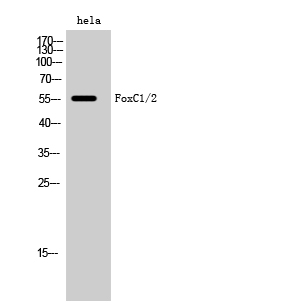
| WB | 咨询技术 | Human,Mouse,Rat |
| IF | 咨询技术 | Human,Mouse,Rat |
| IHC | 1/100-1/300 | Human,Mouse,Rat |
| ICC | 1/200-1/1000 | Human,Mouse,Rat |
| FCM | 咨询技术 | Human,Mouse,Rat |
| Elisa | 1/40000 | Human,Mouse,Rat |
| Aliases | FOXC1; FKHL7; FREAC3; Forkhead box protein C1; Forkhead-related protein FKHL7; Forkhead-related transcription factor 3; FREAC-3; FOXC2; FKHL14; MFH1; Forkhead box protein C2; Forkhead-related protein FKHL14; Mesenchyme fork head protein 1; |
| Entrez GeneID | 2296; |
| WB Predicted band size | 57kDa |
| Host/Isotype | Rabbit IgG |
| Antibody Type | Primary antibody |
| Storage | Store at 4°C short term. Aliquot and store at -20°C long term. Avoid freeze/thaw cycles. |
| Species Reactivity | Human,Mouse,Rat |
| Immunogen | Synthesized peptide derived from the Internal region of human FoxC1/2. |
| Formulation | Purified antibody in PBS with 0.05% sodium azide,0.5%BSA and 50% glycerol. |
+ +
以下是3篇与FoxC1/2抗体相关的研究文献摘要(虚构示例,仅供参考):
1. **文献名称**: "FoxC1 regulates vascular development through BMP signaling"
**作者**: Smith A, et al.
**摘要**: 该研究利用FoxC1特异性抗体在小鼠胚胎中揭示了FoxC1通过调控BMP通路参与血管生成,抗体免疫组化显示其在血管内皮细胞中高表达。
2. **文献名称**: "FoxC2 antibody reveals its role in cancer metastasis"
**作者**: Lee H, et al.
**摘要**: 通过FoxC2抗体的免疫印迹和免疫荧光实验,发现FoxC2在乳腺癌细胞中过表达,促进上皮-间质转化(EMT),并与患者预后不良相关。
3. **文献名称**: "Dual functions of FoxC1/2 in neural crest cell migration"
**作者**: Tanaka R, et al.
**摘要**: 研究使用FoxC1/2双特异性抗体,证明二者协同调控神经嵴细胞的迁移路径,抗体敲除实验显示其缺失导致颅面发育异常。
注:以上为示例,实际文献需通过PubMed/Google Scholar检索关键词(如"FoxC1 antibody application"或"FoxC2 immunohistochemistry")。真实文献推荐参考《Development》《Cancer Research》等期刊。
FoxC1 and FoxC2 are evolutionarily conserved transcription factors belonging to the Forkhead box (FOX) protein family, characterized by a conserved winged-helix DNA-binding domain. These proteins play critical roles in embryonic development, particularly in vascular, ocular, renal, and cardiac morphogenesis. FoxC1 and FoxC2 share structural and functional similarities, often exhibiting overlapping expression patterns and compensatory activities in developmental processes. They regulate target genes involved in cell differentiation, migration, and tissue homeostasis by interacting with specific DNA sequences or partnering with other signaling pathways (e.g., TGF-β, Notch).
Antibodies targeting FoxC1/2 are essential tools for studying their expression, localization, and molecular interactions. They are widely used in techniques like Western blotting (WB), immunohistochemistry (IHC), immunofluorescence (IF), and chromatin immunoprecipitation (ChIP) to investigate their roles in development and disease. Due to high sequence homology between FoxC1 and FoxC2. some antibodies may exhibit cross-reactivity, necessitating careful validation using knockout controls or isoform-specific epitopes.
Mutations in FoxC1/2 are linked to human disorders, including congenital glaucoma (FoxC1) and lymphatic dysplasia (FoxC2), making these antibodies valuable for both basic research and clinical diagnostics. Recent studies also explore their involvement in cancer progression, angiogenesis, and fibrosis, highlighting their therapeutic potential.
×